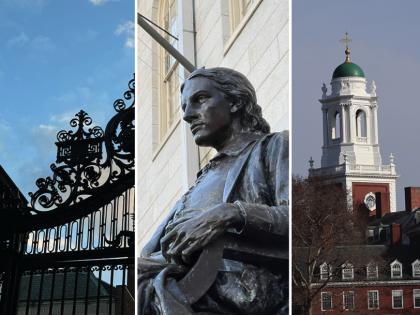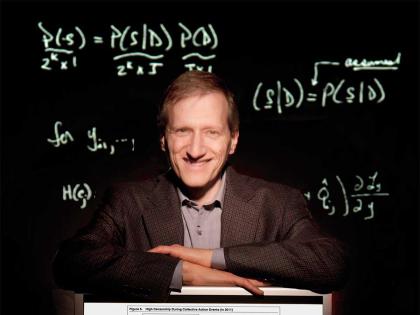To those who have seen many of them, this year's Commencement day seemed a sober affair, fit for the gray skies and gray times. The customary small-scale rejoicings and bittersweet farewells the heart of the matter happened as a matter of course, but the prevailing mood was cautious, with few kittenish displays.
The formal exercises on the morning of June 10 began with Swami Tyagananda praying for peace in Sanskrit, apparently a first at this ceremony, and ended with the Plummer professor of Christian morals, Peter J. Gomes, praying for peace in "our vexed and troubled world."
Kofi Annan, the secretary-general of the United Nations and the afternoon's guest speaker, criticized policies of preemptive defense and argued for adherence to international rules. "What kind of world would it be, and who would want to live in it," he asked, "if every country was allowed to use force, without collective agreement, simply because it thought there might be a threat?" For the text of his address, which was delivered with calm forcefulness and often interrupted by applause, see "A Rule-Based System." The cool, rain-spattered weather gave way to blue skies just as he ended.
The secretary-general has a price on his head 10,000 grams of gold ($125,000) offered by a man presumed to be Osama bin Laden in an audiotape released in May. For safety's sake, therefore, he did not march in either the morning or afternoon processions, but came from Memorial Church at the last minute to take his seat on the stage, where a security man in an academic gown sat behind him. Nor did Annan attend the chief marshal's luncheon at Loeb House with his fellow honorands.
Security precautions throughout the day were conspicuous but not intrusive. Guests entering the Yard had to relinquish bags for inspection, and wands were passed over their persons politely. As Tercentenary Theatre filled up in the morning, pods of people surrounded by vigilant men with wires in their ears whisked by on their way to seats in the VIP section perhaps the prime minister of Turkey, perhaps some other personage. All routine. Nothing untoward occurred.
Full Text 2004 |
| Graduate English Oration |
| Undergraduate English Oration |
| Latin Oration |
| Latin Oration (English Translation) |
| Phi Beta Kappa Oration |
Joining Annan on the program of the afternoon meeting of the Harvard Alumni Association was University president Lawrence H. Summers. He described recent Harvard initiatives to make the American dream more accessible, citing his earlier pledge to free families with incomes of less than $40,000 from contributing at all to the cost of attending the College (see "Aiding Financial Aid" in this issue and "Class-conscious Financial Aid," May-June, page 62). New admissions-outreach policies will seek students of disadvantaged backgrounds, just as minority students have been sought. Moreover, Harvard should help strengthen the pipeline of would-be students of any university. "The battle for America's future," he said, "will be won or lost in American public schools."
Niall Ferguson, an economic historian who studies the British and other empires and who joins the Harvard faculty in the new academic year, was the 2004 Phi Beta Kappa orator on Tuesday, June 8. After addressing the similarities between the Victorian-era British empire and the new American one the role of evangelical Protestantism in each, for example, and a common "patriotism inflamed by a sense of religious mission and strategic insecurity" he forecast the waning of the "special relationship" between Britain and America. He then set the table for much of the rest of Commencement week by providing a partial gloss on Ralph Waldo Emerson's 1837 "The American Scholar," the most famous Phi Beta Kappa oration: "'Ask not,' says Emerson, 'what is doing in...Arabia'; embrace ordinary American life: 'the ballad in the street; the news of the boat.' Wrong. What is doing in Arabia is a thousand times more important than the latest ballad. 'Know thyself,' says Emerson; trust yourself. More important, say I, to know the enemy, and not to trust him an inch. 'The world is nothing,' says Emerson, 'the man is all....If a single man plant himself indomitably on his instincts, and there abide, the huge wide world will come round to him.' No, sorry. The individual man is nothing. The world is what counts. And your indomitable instincts alone will not enable you to understand it."
Nobel Prize-winning economist and Lamont University Professor Amartya Sen said that democracy can take root throughout the world, arguing against those who say, for example, that "so-called Arab 'values' and 'way of life'...militate against the possibility of an Arab democracy." Speaking at the Kennedy School of Government on June 9, Sen encouraged his audience to look at democracy not from a narrow "public ballot" perspective focused on elections and majority rule, but from the much larger "public reason" perspective, in which democracy is "government by discussion." Indeed, he told them, the importance of such public discussion, "which is central to democracy in the broader sense, is a recurrent theme in the history of many countries in the non-Western world" from the Africa of Nelson Mandela's childhood to seventh-century Japan to the southwestern Iranian city of Susa in the time of Alexander the Great, which had an elected council, a popular assembly, and elected magistrates. "Global democracy demands the use of public reasoning at different levels," he told the degree candidates. (N.B.: Taking degrees from the Kennedy School were 537 students from 71 countries.)
Norman Borlaug, an agronomist who won the Nobel Peace Prize in 1970, was a leader in the "green revolution" that brought great improvement in agricultural productivity and fought starvation in Pakistan, India, Mexico, and elsewhere. He spoke to the medical and dental schools on June 10 of the ongoing struggle to feed the burgeoning population of the world's poor. At the School of Public Health, Paul E. Farmer, M.D. '88, Ph.D. '90, professor of medical anthropology in the department of social medicine, said that "The current administration has spent something like $191 billion on war in the Middle East during the same years we have seen [spending on] public health and medicine take a big hit. Imagine if we in this room had even half that war chest...for weapons of mass salvation and, in contrast to certain weapons of mass destruction, these weapons do exist. They are vaccines and programs of prevention and care. They are decent sanitation and enough to eat. Don't you wonder if attacking the social problems of the bottom billion might be a more effective means of expunging terrorism than some of the current strategies being employed?"
After accepting the Radcliffe Medal on Friday, June 11, Harvard honorand Shirley Tilghman, president of Princeton, spoke of revolution. "I would like to suggest that the feminist revolution, which began in the late 1960s and from which I benefited so greatly, is only half over. We have succeeded in broadening the opportunities and choices of young women of college age. But we have not yet created a society in which they are able to realize those aspirations in a fair and equitable manner that allows them to enjoy raising children and have meaningful family lives."
One of the few light spots in Commencement-week oratory perhaps too light was the appearance as the College's Class Day speaker, June 9, of Sacha Baron Cohen, the British comedian who styles himself as rapper Ali G. He appeared in a crimson sweatsuit and beanie (instead of his trademark yellow), tinted goggles, and chunky chains, potentially suicidal apparel in the 95-degree humidity then prevailing. His talk was largely unprintable. Its leitmotif was the progress through his gastrointestinal tract as he spoke of a smuggled packet of several ounces of "the finest Moroccan chronic." In an earlier life, Baron Cohen, who is of Welsh and Israeli descent, passed through Cambridge University. "If you wonder," said Harvard College dean Benedict H. Gross, speaking just before Ali G, "what one can do with a degree in history from Cambridge University, you are about to find out."
 |
| Isaac "Ziggy" Whitman, of Philadelphia, and Theodore Wright, of Kingston, New York, both Kirkland House seniors, sing "Jolly Good Fellow" |
| Photograph by Jim Harrison |
 |
| University marshal Jacqueline A. O'Neill and President Lawrence H. Summers lead the procession from Massachusetts Hall |
| Photograph by Stu Rosner |
 |
| Design School degree candidates throw caution to the winds, waving construction-site tape to celebrate the imminent conferral of their degrees. Some of the GSD students attached small city skylines made of cardboard to one edge of their mortarboards |
| Photograph by Jim Harrison |
 |
| Qianlai Luo, master of science in population and international health, of Ningyuan, Mianning, Sichuan, China, and her parents, who wear traditional Yi dress. Luo is the first of her ethnic group to graduate from Harvard |
| Photograph by Jim Harrison |
 |
| Celebrants under cover |
| Photograph by Stu Rosner |
 |
| Badge of honor, worn by the chaplain and instructor of theology at the Hill School in Pottstown, Pennsylvania |
| Photograph by Stu Rosner |
 |
| Honorand E.O. Wilson in an Oxford doctoral gown; of the several he may wear, it is the most comfortable |
| Photograph by Jim Harrison |
 |
| The baton carried by the University marshal |
| Photograph by Stu Rosner |
 |
| Senior Class Day speaker Ali G |
| Photograph by Jim Harrison |
 |
| Splendidly garlanded, Christina A. Minami, of Kirkland House and Honolulu, lights up the day |
| Photograph by Stu Rosner |
 |
| A Quincy House contingent (from left): Daniel H. Senter, of Piedmont, California; William D. Krause, of New Hartford, New York; and Philip M. Santiago, of Princeton, New Jersey |
| Photograph by Jim Harrison |
 |
| Stephen P. Marks, Bagnoud professor of health and human rights, earned a doctorate from the University of Nice. |
| Photograph by Jim Harrison |
 |
| Candidates from the School of Education brandish foam light bulbs as their degrees are conferred. |
| Photograph by Jim Harrison |
 |
| Kevin Corke, of Southport, Connecticut, earned his M.P.A. as a midcareer student. Candidates from the Kennedy School carried globes, as is their custom, but this year the oceans were rendered not in blue, but in clear plastic. Was this a subtle call for greater transparency in government? |
| Photograph by Stu Rosner |
 |
| The class of '54, who set forth 50 years before on a fine, blue day |
| Photograph by Jim Harrison |








